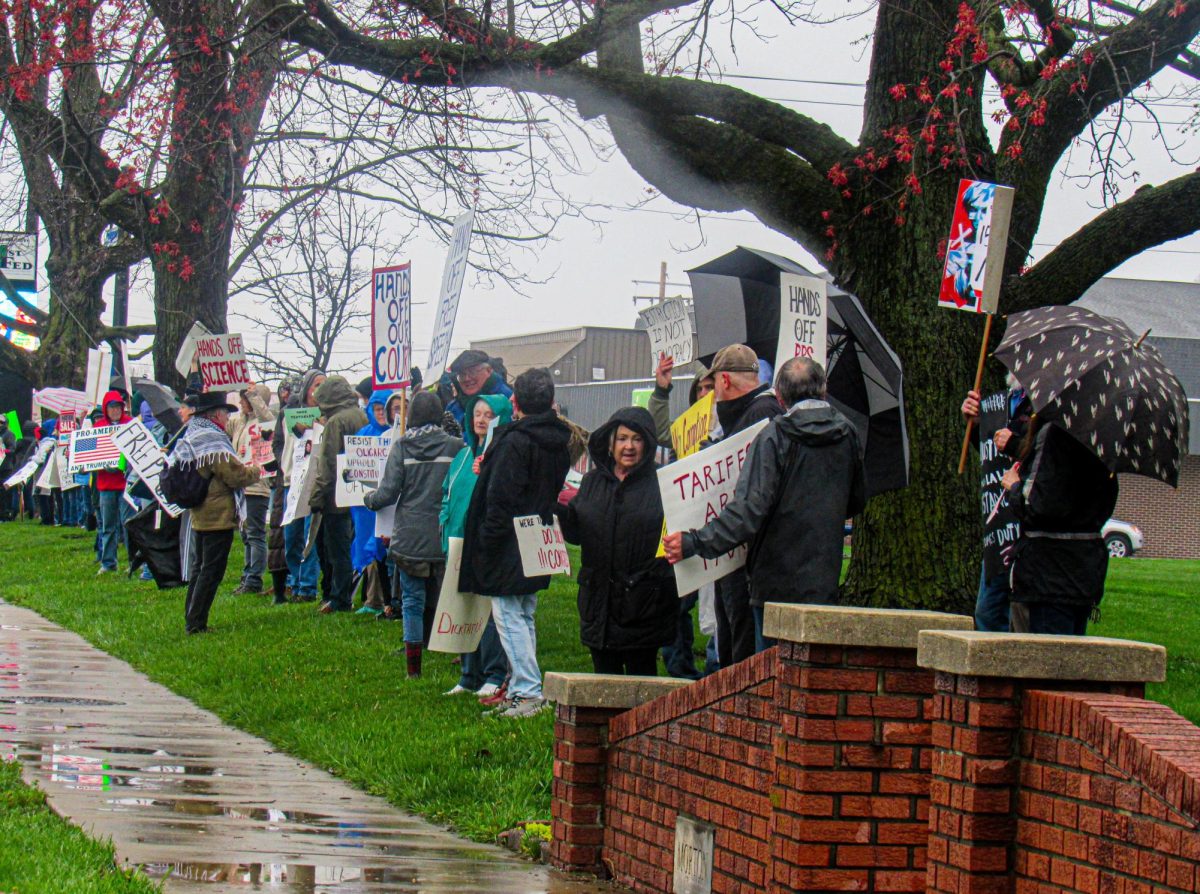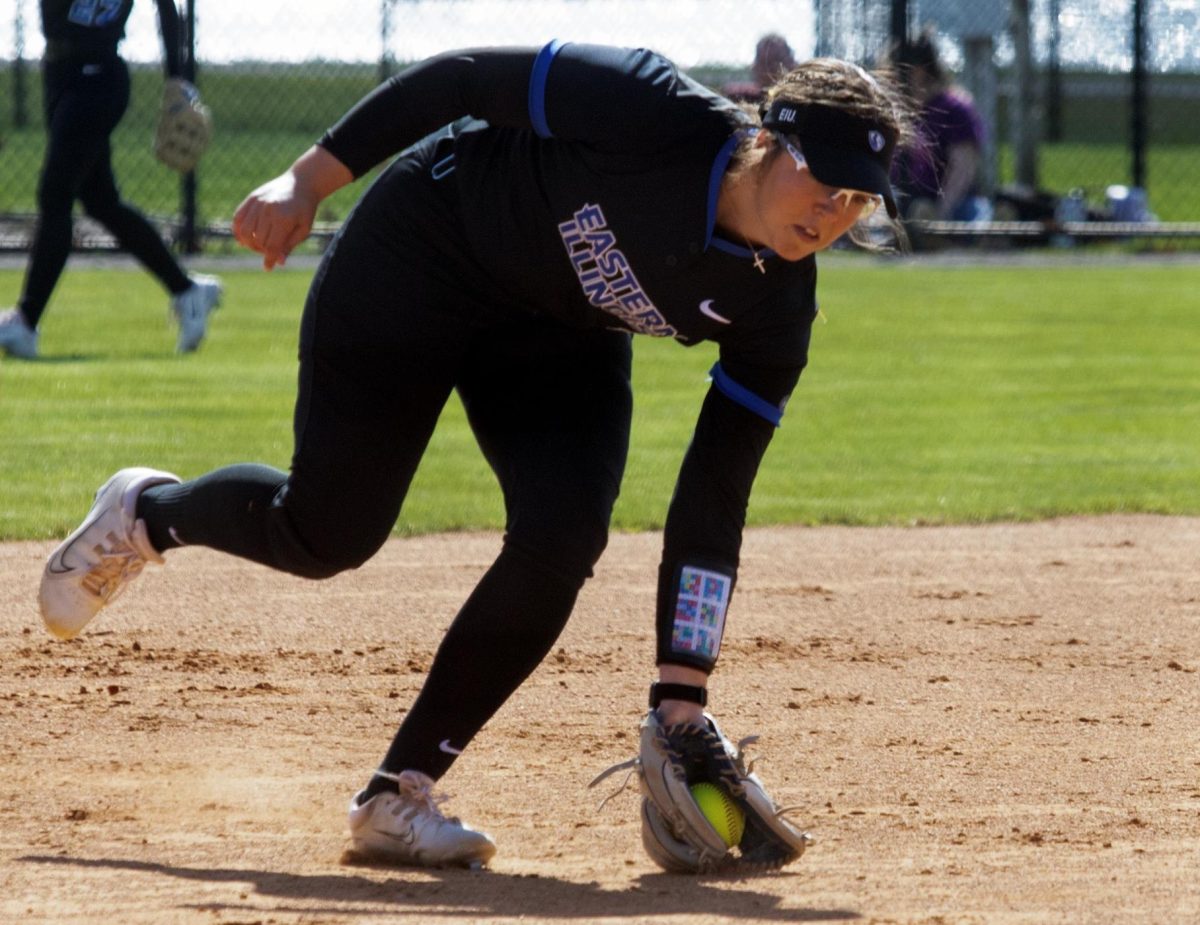Forensics team competes at ISU
It’s hard to imagine a basketball team without a coach on the sidelines barking instructions or a football team without a coach signaling plays to his quarterback, but that’s exactly what the Eastern Forensics speech team dealt with last year.
Eastern competed in the “The 74 Swing” tournament this weekend at Illinois State in Normal, which involved competition between 14 teams.
Two members from Eastern made it to the finals.
Sophomore Aubrey Wiggs finished second in novice poetry and junior Brendan Hughes finished sixth in after-dinner speaking.
“Both of them had never been in the finals before,” said Forensics Vice President Bailey Murphy. “It was really exciting.”
New Forensics director Kyle Kellam has changed that, bringing knowledge, organization and infrastructure to the program.
“They’ve been off the map the last couple of years without a defined director,” Kellam said. “One of our goals this year is to take the preexisting talent that we have and provide infrastructure, accountability and an identity for the program so that when we travel, people can clearly identify, ‘That’s Eastern.'”
With Kellam’s presence, Murphy and president Mary Beth Rodgers are free to focus on things such as team morale.
“(Kellam) has brought stability and support,” Rodgers said. “It’s nice having someone there for us. We are his top priority and we’ve grown and reached more of our potential.”
Murphy took pictures at the tournament, documenting the weekend. She said that she and Rodgers act as intermediaries between the team and Kellam when needed.
“People are supposed to be able to come to me, and I say, ‘Here’s how we fix it,'” Murphy said. “Mary Beth and I are supposed to be able to go to Kyle and say ‘Here’s what the students need.'”
Kellam’s biggest goal is to provide stability and accountability, which he said the students desired, as well as helping them with speechwriting and research.
Kellam got his master’s degree at Ball State and spent time pursuing careers in business before coming to Eastern this year.
“I realized that I enjoyed academia much more,” he said. “I came to Eastern because I wanted to work with the Forensics program as well as teach classes.
“I really missed working with the students and I missed the opportunity to watch students take something they worked really hard in and reach their potential.”
Forensics competes across the state, as well as in tournaments in Kentucky and Wisconsin.
The students write speeches focused on social injustices and current events.
“We’re very fresh,” Kellam said. “If something is more than a year old, we probably won’t write a speech about it.”
Despite the competitive nature of the program, Kellam and the team members agree the primary focus is on education. Anyone is welcome to participate in Forensics, and not all team members even participated in speech in high school.
Rodgers did not compete until her sophomore year.
“It helps to have competed in high school, but I didn’t have to unlearn any bad high school habits,” she said.
Kellam said he uses the vehicle of competition to expand upon the educational nature of the program. Teaching the research and speechwriting is very valuable, but can only go so far without the feedback of the judges and the audience.
“The social dynamic of the activity is really a third of the activity; how to politic and network, and that’s where the majority of that learning occurs,” he said.
With only 10 team members Eastern is a smaller program than many they compete against, including Illinois State and Bradley University in Peoria, but the program is somewhat unique in that it receives funding from the school, Kellam said.
The funding includes nine full scholarships that are distributed based on need, seniority and dedication to the program, not on ability.
“Eastern has a lot of support from the department,” Kellam said. “I think, as a school, we have a quality of student who likes to learn.”
Team members compete in three categories of events: public address, limited preparation, and literary interpretation.
Public address speaking consists of persuasive speeches, informative speaking, communication analysis and after-dinner speaking.
Limited prep speeches, which involves extemporaneous speeches where competitors have 30 minutes to prepare a seven-minute speech and impromptu speeches where only two minutes are allowed.
Interpretations of literature are dramatic interpretations of poetry and literary prose.














![[Thumbnail Edition] Charleston High School sophomore Railyn Cox pitches the ball during Charleston's 8-7 win over Flora High School on Monday, March 31.](https://www.dailyeasternnews.com/wp-content/uploads/2025/04/SBHS_01_O-1-e1743982413843-1200x1023.jpg)


![[Thumbnail Edition] Senior Foward Macy McGlone, getsw the ball and gets the point during the first half of the game aginst Western Illinois University,, Eastern Illinois University Lost to Western Illinois University Thursday March 6 20205, 78-75 EIU lost making it the end of their season](https://www.dailyeasternnews.com/wp-content/uploads/2025/03/WBB_OVC_03_O-1-e1743361637111-1200x614.jpg)












![[THUMBNAIL EDITION] (From left to right) Head football coach Chris Wilkerson works with his son student assistant coach Peyton Wilkerson at football practice at O'Brien Field on the Eastern Illinois University campus on Thursday.](https://www.dailyeasternnews.com/wp-content/uploads/2025/04/FB_25_O-1-e1744234837107-1200x596.jpg)

























![The Weeklings lead guitarist John Merjave [Left] and guitarist Bob Burger [Right] perform "I Am the Walrus" at The Weeklings Beatles Bash concert in the Dvorak Concert Hall on Saturday.](https://www.dailyeasternnews.com/wp-content/uploads/2025/03/WL_01_O-1200x900.jpg)
















